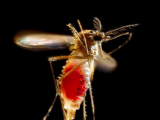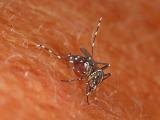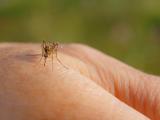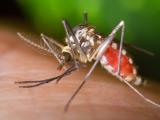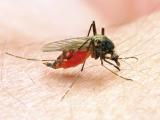Apr 20, 2005 (CIDRAP News) – A small, preliminary clinical trial of a vaccine for West Nile virus (WNV) was launched this week by the National Institute of Allergy and Infectious Diseases (NIAID).
The vaccine is being tested for safety and immunogenicity in 15 healthy adult volunteers at the National Institutes of Health's Clinical Center in Bethesda, Md., the NIAID announced Apr 18. The vaccine is one of three West Nile virus vaccines being developed with federal support. No vaccine for the disease has yet been licensed.
The NIAID said it developed the vaccine jointly with Vical, Inc., of San Diego. It is based on an animal vaccine tested at the Centers for Disease Control and Prevention (CDC). A Vical news release said the company has an option for exclusive rights to market the vaccine.
Whereas conventional vaccines use a whole, killed version of the target virus, the NIAID-Vical vaccine uses a small ring of WNV DNA, according to the NIAID. The ring, called a plasmid, contains genes that code for two key surface proteins from the virus.
"When the vaccine is injected into the muscle, the inner machinery of the muscle cells 'reads' the DNA and converts it into two WNV proteins," the NIAID said. "Recognizing that the proteins are foreign, the muscle cells display them on their surface to alert the body's immune system—both helper T cells, which spur the production of antibodies to block the WNV from gaining entry into cells, and killer T cells, which kill WNV-infected cells outright."
"The DNA vaccine's exploitation of both cellular and antibody immunity offers a potentially potent defense against West Nile virus," said Barney Graham, MD, PhD, chief of the NIAID Vaccine Research Center's Clinical Trials Core Laboratory, in the NIAID release. "In our experience in clinical trials, DNA vaccines generally cause few side effects, making them a promising alternative to conventional vaccines."
Vical said conventional vaccines using whole WNV are available for horses and some species of birds. But developing a conventional human vaccine against WNV could take "many years" of development and testing to verify safety and effectiveness, the company said.
Although no DNA vaccine has yet been licensed, the NIAID has developed and is testing DNA vaccines against HIV/AIDS, Ebola virus, and SARS (severe acute respiratory syndrome).
In the phase 1 WNV vaccine trial, the 15 volunteers will receive three injections with a needle-free injector about 4 weeks apart, the NIAID said. They will be monitored for 32 weeks for side effects and for WNV-specific antibodies and T cells.
The vaccine being tested is based on one developed by CDC researcher Jeff Chang, DVM, PhD, of Fort Collins, Colo. That vaccine has been tested successfully in a variety of animals, including mice, horses, and crows, officials said.
The NIAID said two other human WNV vaccines developed with its support are already in phase 1 trials. Called chimeric vaccines, they combine WNV genes with genes from a closely related virus. A vaccine developed by Acambis uses genes from WNV and the yellow fever virus, while the NIAID's own researchers made a vaccine that combines dengue virus with WNV.
WNV was discovered in Uganda in 1937 and was first identified in the United States in New York City in 1999. There were 2,470 cases of WNV disease in the country in 2004, including 88 deaths. People usually catch the virus from the bite of a mosquito that has picked up the pathogen from an infected bird or animal. Most people experience no symptoms or only mild illness, but the virus can cause serious infections of the brain and nervous system.
See also:
Apr 18 NIAID news release
